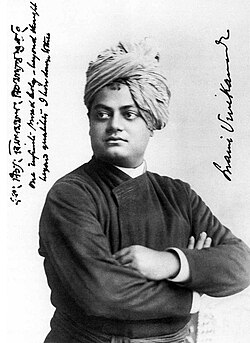Swami Vivekananda Quote
The Christian is not to become a Hindu or a Buddhist, nor is a Hindu or a Buddhist to become a Christian. But each must assimilate the spirit of the others and yet preserve his individuality and grow according to his own law of growth. If the Parliament of Religions has shown anything to the world, it is this: It has proved to the world that holiness, purity, and charity are not the exclusive possessions of any church in the world, and that every system has produced men and women of the most exalted character. In the face of this evidence, if anybody dreams of the exclusive survival of his own religion at the expense of the others, I pity him from the bottom of my heart and point out to him that upon the banner of every religion will soon be written, in spite of resistance: "Help and not Fight," "Assimilation and not Destruction," "Harmony and Peace and not Dissension".
The Christian is not to become a Hindu or a Buddhist, nor is a Hindu or a Buddhist to become a Christian. But each must assimilate the spirit of the others and yet preserve his individuality and grow according to his own law of growth. If the Parliament of Religions has shown anything to the world, it is this: It has proved to the world that holiness, purity, and charity are not the exclusive possessions of any church in the world, and that every system has produced men and women of the most exalted character. In the face of this evidence, if anybody dreams of the exclusive survival of his own religion at the expense of the others, I pity him from the bottom of my heart and point out to him that upon the banner of every religion will soon be written, in spite of resistance: "Help and not Fight," "Assimilation and not Destruction," "Harmony and Peace and not Dissension".
Related Quotes
About Swami Vivekananda
Born into an aristocratic Bengali Kayastha family in Calcutta (now Kolkata), Vivekananda showed an early inclination towards religion and spirituality. At the age of 18, he met Ramakrishna and became his devoted disciple, and later took up the vows of a sannyasin (renunciate). Following Ramakrishna’s death, Vivekananda travelled extensively across the Indian subcontinent as a wandering monk, gaining first-hand knowledge of the often harsh living conditions endured by the Indian masses under then British India, he sought a way to alleviate their suffering by establishing social services but lacked capital. In 1893, he travelled to the United States to participate in the Parliament of the World's Religions in Chicago, where he delivered a landmark speech beginning with the words "Sisters and brothers of America...". His powerful message introduced Hindu spiritual thought and advocated for both religious tolerance and universal acceptance. The speech made a profound impression; an American newspaper described him as "an orator by divine right and undoubtedly the greatest figure at the Parliament".
Following his success in Chicago, Vivekananda lectured widely across the United States, the United Kingdom, and continental Europe, disseminating the essential principles of Hindu philosophy. He established the Vedanta Society of New York and the Vedanta Society of San Francisco (now the Vedanta Society of Northern California), both of which became the foundations for later Vedanta Societies in the West. In India, he founded the Ramakrishna Math, a monastic order for spiritual training, and the Ramakrishna Mission, dedicated to social services, education, and humanitarian work.
Vivekananda is widely regarded as one of the greatest modern Indian thinkers. He was a prominent philosopher, social reformer, and the most successful proponent of Vedanta philosophy abroad. He played a crucial role in the Hindu revivalist movement and contributed significantly to the rise and development of Indian nationalism in colonial India. Celebrated as a patriotic saint, his birth anniversary is observed in India as National Youth Day.
